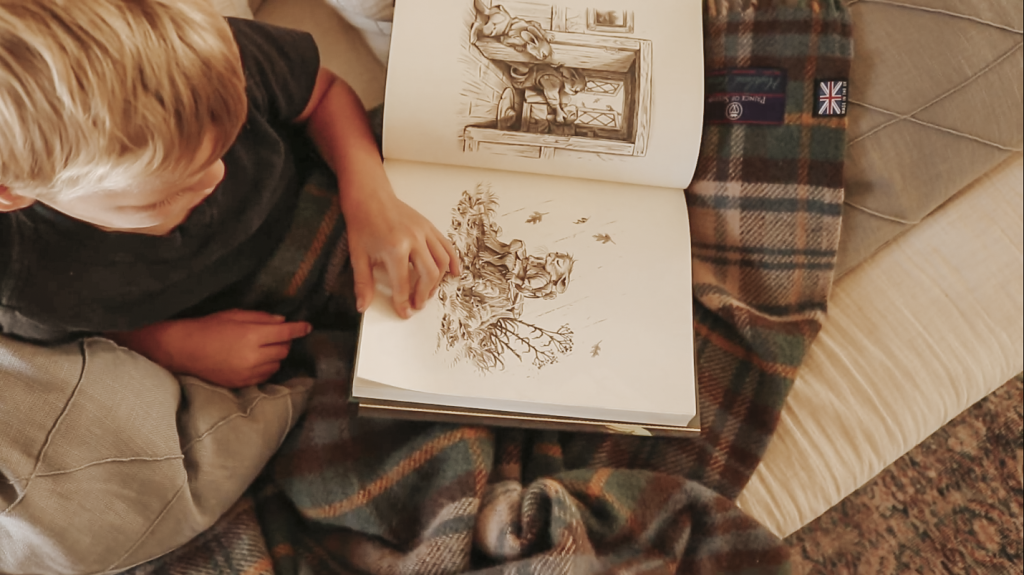The Subconscious Habits Secretly Wrecking Your Peace as a Christian Mother
It’s what keeps you up at night thinking, “This is how they’ll remember me.” You feel overworked, overstimulated, and overwhelmed. You feel like your days are drudgery.
I have the best news for you—there is a way out.
So today, that’s what I’m writing about the Subconscious Habits Secretly Wrecking Your Peace as a Christian Mother and how you can transform them to reclaim joy and calm in your home.
The Turning Point: A Desire to Glorify God
I’ll never forget the moment I decided to make a bold change in my life. I was in the shower, reflecting on life, and this fire ignited in me to be a woman who glorifies God—a true Proverbs 31 woman.
The Bible affirms this desire: “Delight yourself in the Lord, and he will give you the desires of your heart” (Psalm 37:4).
But I hit a wall. I didn’t know how to change. Doubts crept in—would my family think I was faking it? How long would it take? As a mother who used to scream at my poor sweet children on a daily basis, I felt like a lost cause.
But here’s the thing: sanctification is a lifelong journey, and God can work miracles quickly. As 2 Corinthians 5:17 says, “If anyone is in Christ, he is a new creation. The old has passed away; behold, the new has come.”
And it turns out, all I had to do was remove these six subconscious habits to find that peace again and become a completely different mother.
Your peace at home isn’t just disrupted by chaos—it’s secretly sabotaged by small, subconscious habits your brain has developed over time.
Most of these habits are invisible because they happen without thought, but they shape your daily experience and keep you stuck in stress, frustration, and burnout.
Subconscious Habit 1: Living in Fear and Anxiety

I used to struggle with mom rage—anger that seemed to come out of nowhere. I thought it was just a lack of self-control, but it was rooted in fear and anxiety.
And if I let these emotions take over my thoughts, then I was strengthening those neural pathways, making them my default response, which is often what led to the mom rage I was experiencing.
Let me share two examples:
When I was newly pregnant with my second, I had anxiety about how hard life would be with two very small children and I let that anxiety dictate the way I parented. I remember one day deciding that I needed to teach my child how to buckle himself into his car seat and I would get SO mad when he didn’t do it properly.
Why? Because I’m a monster? No. Because I had anxiety about how I would buckle him in as well as a baby. In hindsight that sounds ridiculous because now I do so much more and don’t even think about it. But at the time it was a real fear.
Now, when anxiety about something like this creeps in, I take my thoughts captive and I reflect on how God has expanded my capacity and trust Him to guide me.
Another trigger for me was when my kids threw food—I’d lose my mind. My panic wasn’t really about the mess; it was fear of losing control forever.
It was driven by anxiety that if I didn’t stop it immediately, my house would be chaos forever and spiral out of control. I was unsure how to discipline effectively, and that fear fueled my anger because I knew I needed to correct the issue but I didn’t know how to do it effectively.
I wasn’t leaning on the promise of the Lord in James 1:5-8, which says that when you ask for wisdom He WILL deliver.
Now, with three young kids, my home stays reasonably tidy, and I’ve learned to discipline without rage.
How to Break the Cycle of Fear and Anxiety
First, you need to stop indulging in the anxious, fearful future-casting thoughts and submit them to the Lord.
When fear or anxiety spiral, say something like, “I submit this moment to the Lord, and I know He’s taking really good care of me.”
Then remember all the things you used to have anxiety over and how the Lord worked in your life through those times of need. Write them down if you need to and keep the paper on your counter to turn to in times of need and remember that He is Psalm 46:1, “a very present help in trouble.”
Next, the answer to anxiety isn’t just to squash it—it’s to replace it with an act of trust in the Lord. Spend time at God’s feet before anxiety hits—focus on His character.
So many of the Psalms are laments—people who were broken and shattered with grief, anxiety, and fear. And how does God respond? He always points them to WHO He is.
Replacing anxiety with trust in God’s nature dissolves its power. As Philippians 4:6-7 says, “Do not be anxious about anything, but in everything by prayer and supplication with thanksgiving let your requests be made known to God. And the peace of God, which surpasses all understanding, will guard your hearts and minds in Christ Jesus.”
That means that while everything in the world is going wrong around you, you will have supernatural peace—peace that doesn’t make sense to the world—but you aren’t of the world; you belong to Christ.
Implement these and you will begin to show up better. Things that used to annoy you and anger you won’t even phase you anymore.
Motherhood taught me something vital: regulating my own nervous system is harder than teaching my children to regulate theirs. Once I learned how to do this, I became a patient, joyful mother—and a calmer wife.
When times were bad, I pleaded with the Lord to carve out those memories from my family’s minds. Now I know He can use even those memories to shape and disciple my children to change the course of their own parenting.
Subconscious Habit 2: Believing Grace Equals Weakness

Somewhere along the way, many of us started believing that showing grace makes us a pushover—that if we don’t come down hard, we’ll lose control of our homes.
A new student recently asked me how to balance grace with boundaries. Her kids run through the kitchen screaming, and it overwhelms her. She wondered if she should reframe her reaction (“I’ll miss this noise when they’re grown”) or set a boundary (“no screaming in the kitchen”).
She also struggled with grace feeling like being “too meek” and wondered about righteous anger.
Here’s the truth: God gave us emotions, including anger, for a reason—it signals when something needs to change. But Ephesians 4:26 says, “Be angry and do not sin,” and James 1:20 warns, “The anger of man does not produce the righteousness of God.”
Grace isn’t weakness; it’s strength and wisdom under control, as Jesus showed (Matthew 11:29).
In the kitchen scenario, set a clear boundary: “No running or screaming in the kitchen.” Then, when this boundary is broken, implement the consequence consistently. That discipline in itself is grace because it protects your children, trains them in righteousness, and spares them from the long-term fruit of unchecked sin.
Ginger Hubbard says that she used to tell her children, “I love you too much to let this sin grow in your heart.”
This teaches your children respect, and that your yeses mean yes and no means no as it says in Matthew 5:37.
Grace means enforcing boundaries calmly, without vengeance. You’re not a pushover—you’re walking in wisdom, balancing grace and truth (John 1:14).
The key is grace + truth. You can set boundaries without cruelty, show firmness without bitterness, and respond with wisdom without suppressing the natural emotions God gave you.
Subconscious Habit 3: Avoiding Confession
Somewhere deep down, many of us believe confession makes us look weak, or that it’s unnecessary because “everyone already knows what happened.” But in reality, avoiding confession doesn’t keep the peace—it actually poisons our conscience.
Confession is powerful, yet we tend to avoid it—sometimes we downplay our sin, or we confess only to God and not the person affected, or we think the sin was too “small.”
James 5:16 says, “Confess your sins to one another and pray for one another, that you may be healed.”
Recently I did this with my husband with something I did a couple years ago. For whatever reason the Lord put it on my mind and convicted me that I needed to confess. It wasn’t a huge issue, although at the time it felt too huge to confess—I was so scared and SO resistant.
When I finally confessed, I felt instant relief.
So if you’re sitting there feeling convicted about something right this very moment, thinking, “No, not this sin, please no”—do it. Do it today and free yourself.
Subconscious Habit 4: Ruminating on Unhelpful Thoughts

We tend to call it “processing” or “thinking it through,” but really it’s just ruminating—chewing the same thought over and over until it drains us.
Recently, a major event hit me hard. I obsessed over it, researching endlessly and losing sleep for days. I told myself I was “processing,” but my husband gently pointed out I needed a break. He was right.
Philippians 4:8 says, “Whatever is true, whatever is honorable… think about these things.”
So, I shifted my focus from frustration to what was commendable about the situation, and my anxiety faded. I started sleeping again, and this big catastrophe stopped having a hold on my personal life.
Stop ruminating on what doesn’t serve you and fix your mind on God’s truth instead.
Subconscious Habit 5: Delaying Prayer
We don’t usually reject prayer—we just postpone it. “I’ll pray after the kids are asleep.” “I’ll pray when I have more time.” “Oh, I’ll pray for you.”
Before we know it, the day ends, our burdens remain, and we’ve carried weights God never asked us to hold.
Take advantage of each little opportunity to connect with the Lord throughout your day.
How often do you tell a friend, “I’ll be praying for you,” but never actually circle back to it? Why not stop right then and there—at the sink, in the car, while folding laundry—and lift her up in prayer?
Connect with God in the moment. These spontaneous prayers build a rhythm of intimacy with Him.
As 1 Thessalonians 5:17 says, “Pray without ceasing.”
That doesn’t mean you’re locked in your prayer closet all day—it means prayer becomes the backdrop of your life, the constant undercurrent that shapes your thoughts, attitudes, and responses.
Prayer can absolutely be a set-apart time: sitting down with a cup of coffee, opening your journal, and pouring out your heart on your knees before the Lord.
But don’t dismiss the small, simple prayers whispered throughout your day—the breath prayers, the one-sentence cries for wisdom, the quick thank-you’s.
The goal isn’t perfect form; it’s constant communion.
Subconscious Habit 6: Your Phone Addiction

Phones steal our attention from life’s real beauty, and before you know it, you’re grumbling because your life is horrible—when in reality, you’ve missed the moments that actually make it rich: the laughter of your children, the warmth of the sun on your face, the simple rhythm of a home well-lived.
Watching your kids playing has to be more entertaining than what’s on your phone.
The other day I sat in awe watching my three children playing in the backyard. It was a late summer day and it had been a hot one but was starting to cool off. My dear sweet husband was making burgers on the grill. My one-year-old was playing under the maple tree, my two-year-old was riding on her pink radio flyer bike, and my four-year-old was playing with grasshoppers in the dirt.
We were all sweaty, dirty, and happy in this perfectly imperfect moment.
Had my face been buried in my phone, I would have missed this whole scene—and what a shame that would be.
This is real life—simple and imperfectly beautiful. Being present transforms your perspective on motherhood.
Reclaiming Peace and Presence
Your peace is not lost.
These subconscious habits don’t have to define your home, your family, or your life. With intentional steps, God’s guidance, and a bit of practical training, you can reclaim calm, joy, and presence—even in the chaos of motherhood.
Inside my free workshop, I walk you step by step through rewiring these habits, calming your nervous system, and stepping fully into the mother and wife God created you to be.







